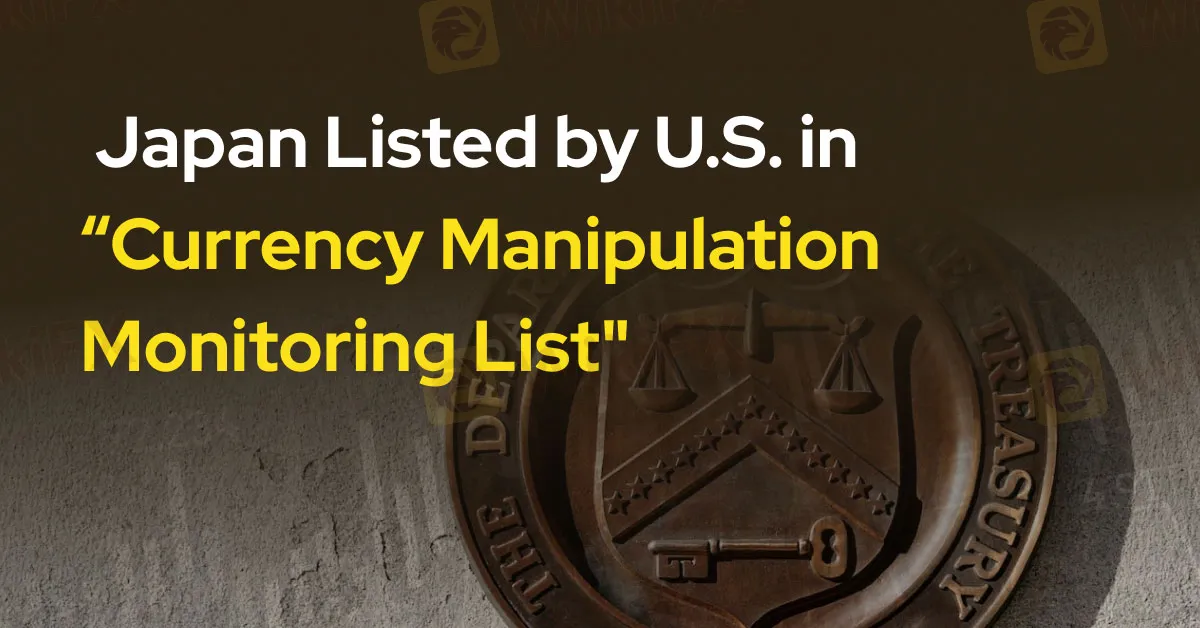Japan Listed by U.S. in “Currency Manipulation Monitoring List"
Abstract:The U.S. Treasury Department said Thursday it has once again put Japan on a list of major trading partners that it monitors for potentially unfair foreign exchange practices. According to a June 21 report from Japan's Asahi Shimbun website, the U.S. Department of the Treasury announced on the 20th that Japan has once again been included in its "currency manipulation monitoring list."

The U.S. Treasury Department said Thursday it has once again put Japan on a list of major trading partners that it monitors for potentially unfair foreign exchange practices. According to a June 21 report from Japan's Asahi Shimbun website, the U.S. Department of the Treasury announced on the 20th that Japan has once again been included in its “currency manipulation monitoring list.” Analysts suggest that while the U.S. did not label Japan as a currency manipulator, placing it on the monitoring list serves as a warning. The United States, being the world's largest current account deficit country, closely scrutinizes countries and regions that accumulate significant trade surpluses with the U.S., suspecting deliberate currency depreciation to boost exports.
The U.S. Congress submits a report every six months on major trading partners' currency policies, and Japan has re-entered the monitoring list after a year. In 2023, Japan's trade surplus with the U.S. surged, with its current account surplus exceeding 3% of GDP, meeting the criteria set by the U.S. Treasury for inclusion in the monitoring list. Other countries and regions on the list include Germany, Malaysia, Singapore, Vietnam, mainland China, and Taiwan.
Japanese Finance Minister Taro Aso, speaking at a press conference after a Cabinet meeting on the 21st, commented on Japan being monitored again, stating, “This conclusion is based on mechanical evaluations by the U.S. regarding indicators such as the current account surplus and trade surplus with the U.S., and does not imply that the U.S. believes Japan's currency policy is problematic.”
Simultaneously, regarding Japan's interventions earlier this year to prevent a historic depreciation of the yen, the U.S. Treasury noted in its report, “Japan regularly discloses the results of its interventions, ensuring transparency.” Treasury officials interviewed on the 20th also expressed their view that Japan's currency policy is not problematic, describing Japan's interventions as counteracting competitive devaluation.

Read more

Axi Launches Direct Crypto Trading Service as Brokers Expand Digital Asset Offerings
With the launch of the Axi Buy Crypto service, the company joins brokers such as Pepperstone and IG that have begun offering direct cryptocurrency trading to clients.

WikiEXPO Global Guest Interview – Fu Peng: Global Financial Markets Are Undergoing Once-in-a-Century
From July 23 to 24, renowned economist Mr. Fu Peng — a specially appointed financial think tank expert for national media outlets including Xinhua News Agency and China Central Television — will attend WikiEXPO in Hong Kong. He will join global industry leaders, regulatory representatives, and fintech experts to discuss new challenges in trading security amid profound macroeconomic transformation.

OANDA to Transfer Prop Trading Business to FTMO Platform
After FTMO’s acquisition of OANDA, the transfer of the OANDA Prop Trader service to the FTMO platform begins.

Emerging Ponzi Scheme Scam Network: Early-Stage Risk Warning for Global Investors
Although no large-scale public complaints have yet surfaced, we have identified a coordinated cluster of suspicious investment platforms exhibiting strong characteristics of organized fraud operations.
WikiFX Broker
Latest News
CySEC Withdraws CIF License of OBR Investments Ltd (OBRInvest)
RM115 Million Lost in a Month: Are Malaysians Underestimating Investment Scams?
Invest RM300, Make RM10,000? Police Say It’s a Scam
XBTFX Review: Beware of Offshore Regulated Forex Traps
FX Markets: King Dollar Reigns Amid Chaos; BoJ Eyes "Neutral" Rates
War in the Middle East: Oil Spikes and Stocks Tumble as Conflict Enters "Uncharted Territory"
Geopolitical Conflict Drives Gold Rally as Insurers Cut Gulf Coverage
Middle East Tensions Rattle Risk Sentiment: Airspace Closures Signal Supply Fears
Oil Markets Rally as Escalating Middle East Conflict Threatens Supply Lines
Investment Scams That Could Be Targeting Malaysians Right Now
Rate Calc
